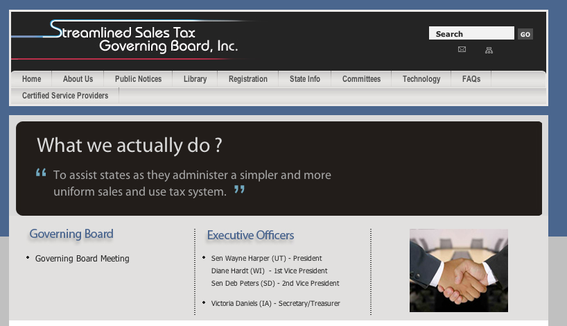The possibility of Congress passing legislation that requires online retailers to collect sales taxes has been discussed for years. People use to asked me if I was worried about it. I would reply, “Not until legislation is in the final debate in Congress.”
Well, that final debate is here. In a bi-partisan vote, the U.S. Senate approved the bill today. The House takes up debate soon. President Obama has indicated he supports the legislation.
This article will not address the wisdom of the bill. Instead, I’ll address the operational aspects of implementing it, including the uncertainty of many of its requirements.
Background on Sales Taxes
In 1992, the Supreme Court ruled, in the Quill office-supply catalog case, that expecting merchants to comply with thousands of separate sales tax districts where customers reside — states, cities, municipalities — is unrealistic (with the technology at the time) and, as such, merchants can’t be responsible for the collection and payment of those taxes. The exceptions made by the Court were for states where merchants had a physical presence — i.e. “nexus.”
Fast forward to the rise of ecommerce, the pressure it puts on local brick-and-mortar stores, and the corresponding reduction of sales tax revenue to states and municipalities. The result is a mishmash of state laws, interpretations of nexus, and a slew of court cases.
The Marketplace Fairness Act of 2013 is intended to solve that confusion. But the language itself is fuzzy and, to me, leaves many unanswered questions. It attempts to create a uniform mechanism for states and municipalities to collect the tax, and for online merchants to calculate and pay it. It applies to all retailers who exceed the small seller exception — i.e., annual U.S. sales of more than $1,000,000. The bill is short and readable.
Summary of Marketplace Fairness Act of 2013
- SST states. Any state belonging to Streamlined Sales Tax Governing Board — SST — can mandate the collection of sales and use taxes beginning 90 days after the enactment of the bill. Currently, 22 states are members. For more on SST, see “Streamlined Sales-Tax Director on Efforts to Simplify,” our previous interview.
- Non-SST states that meet alternative criteria and provide free software for retailers to use may also join. Likely, states will simply join the SST if the legislation passes.
- Small seller exemption. Retailers with less than $1,000,000 in U.S. sales in the preceding calendar year are exempt in the current bill.
- Free software. States must provide free calculation and collection software to retailers.
- No new tax. This bill does not allow for the imposition of any new taxes — so called “Internet tax” — beyond what the states and municipalities already impose.
- All retailers. The bill applies to all retailers: Online, physical stores, or multi-channel.
- Senate, not House. The bill has been approved by the Senate, not the House of Representatives, where it likely will face tougher opposition.
What Does This Mean to You?
At a first glance, compliance with the bill may appear straightforward. Add some free software to your cart, collect and pay the tax using an automated system, and it’s done. But it’s more complex than that.
Ecommerce merchants will need to address the following.
- Integrate the certified collection software Only software certified by SST qualifies.
- Develop processes to make payments and continually monitor compliance at all levels. This includes product returns, and synchronizing the sales tax refunds and with all required systems.
- Manage cash flow to ensure payments will be made to tax agencies in a timely fashion.
- Evaluate the competitive impact of higher pricing.
Certified Providers
There are currently six companies that have been certified by the SST. They are:
- AccurateTax;
- Avalara;
- CCH;
- Exactor;
- FedTax;
- Taxware.
These companies have negotiated with the SST to receive a portion of the sales tax collections, thus allowing them to supply the software for no charge. But your shopping cart will need to integrate with these companies. Based on my preliminary research, they currently supply built-in integration with a relatively small percentage of carts.
Accounting Setup
Even if your cart integrates with the tax software, you may want to track sales tax collections by state. You will likely need to create new accounts in your financial system, such as QuickBooks or Sage, for each state to facilitate that, and tie those into transactions from your shopping cart. You will also likely need to record your liability to each state as you collect the unpaid taxes. You’ll need to make sure to actually set aside those funds for future payment. This will impact your cash flow projections and management. And you’ll want to make sure that returns can easily be processed to update the tax liabilities by state.
The biggest impact may be price competition. Currently, you may have an $8 to $10 price advantage in some states over an in-state retailer, on a $100 purchase. Will that impact your business? It may put your business at a price disadvantage to the local retailer who has the item in stock. It may force more “free shipping” to offset the sales tax impact.
Conclusion
Start investigating your company’s technology and processes affected by the sales-tax bill. If it goes into effect this year, it could hit in the middle of the holiday season, which is not the best time for system or process changes.





